Philosophy Colloquium

"The great puzzle of social norms is not why people obey them, even when it is not in their self-interest to do so. It is, how do shared standards of conduct ever acquire their normativity to begin with? Once we understand this, there is no further difficulty in understanding the motive to obey them. We obey them because we believe that we ought to." (Elizabeth Anderson)
I propose an answer Anderson's question "how do shared standards of conduct ever acquire their normativity to begin with?".
First, I distinguish two kinds of answers:
Internalism labels views that develop some version of the idea that both the source of social role normativity and the reason why particular norms attach to individuals originate in the same place, namely in the subject or agent herself. What these views share is a focus on the subject (or subjects) --her preferences, endorsements or recognitive attitudes--as the source of normativity, including social role normativity. According to these views social normativity enters the world through the attitudes of the persons who are subject to the norms.
Externalism refers to positions that root social role normativity in the social world itself, in its positions, institutions, and larger architecture. The core insight of externalism is that in some circumstances the structure of an enterprise or activity can bring with it normative demands quite independently of the attitudes of those who engage with it.
Then I develop a new externalist model for social role normativity: the artisanal model. Just as a ceramicist or a chef is responsive to and evaluable under a set of artisanal norms so too is a mother and an academic. The source of normativity is the technique/expertise, and these are independent of the preferences, endorsements or recognitive attitudes of individuals.






